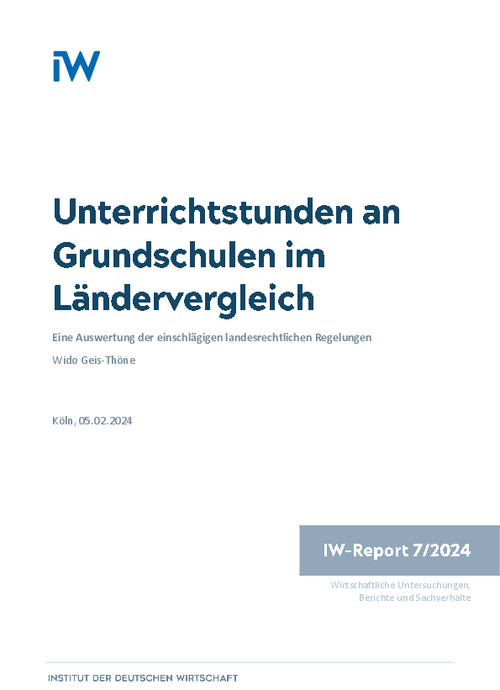Young people's educational paths are very much predetermined during their primary school years. On the one hand, the basic skills of reading, writing and maths are acquired, and, on the other hand, the joint learning of all children ends with the transition to secondary level I.

Teaching hours at elementary school country comparison

Young people's educational paths are very much predetermined during their primary school years. On the one hand, the basic skills of reading, writing and maths are acquired, and, on the other hand, the joint learning of all children ends with the transition to secondary level I.
The regular primary school attendance lasts four years, with Berlin and Brandenburg being an exception with six-year primary schools. In total, primary schools in years 1 to 4 teach between 92 hours per week in Hesse and Schleswig-Holstein and 108 hours per week in Hamburg, which corresponds to an average of 23 to 27 hours in each school year. The total amount of maths lessons is very similar in all states, ranging from 20 to 22 hours, whereas there are very large differences in German lessons. At 31 hours, Berlin has more than one and a half times as much as the Saarland at 20 hours. However, the state regulations in Saarland provide for a larger number of remedial lessons, which are compulsory for all pupils and can be used for German lessons. Hesse, where this is not the case, is not significantly higher with 22 hours. The Standing Scientific Commission of the Conference of the Ministers of Education and Cultural Affairs recommends a minimum of 24 German lessons.
In addition, all primary schools also teach general studies, a first foreign language, which may be English or French, physical education and various artistic subjects, including theatre and handicrafts as well as art and music. Religion or ethics is not part of the compulsory curriculum in Berlin and Brandenburg in years 1 to 4. In other states it is very important, with up to ten hours in Bavaria and Rhineland-Palatinate. Some states regulate the number of lessons for several subjects together, which can increase the flexibility of schools when organising lessons, but also entails risks. In particular, there is a risk that bottlenecks in the availability of suitable rooms could lead to restrictions in physical education lessons. In view of the increasing number of children with inadequate swimming skills, it would also make sense to organise swimming lessons separately from other physical education.

Teaching hours at elementary school country comparison

More on the topic

Parental contributions for childcare in a regional comparison
The federal states take very different approaches to organising parental participation in the costs of state and state-funded childcare.
IW
Parental contributions for all-day care for primary school children
The organisation of all-day care for primary school children varies greatly from region to region in Germany. In most of the eastern German states it takes place mainly in after-school care centres, which are part of the child and youth welfare services, ...
IW